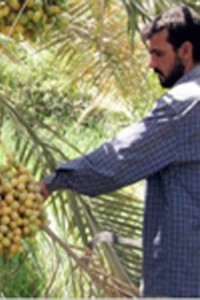
The first shipment of Iraqi dates in two decades was flown to London in September 2010 under the auspices of USAID/Iraq’s agribusiness program. The project promises renewed export prospects for Iraq’s fresh and processed foods.
Iraqi dates have long been considered among the world’s best. During the 1970s its palms produced 60 percent of the world’s supply. But exports dwindled following the 1991 Gulf War.
The USAID-Inma program hosted a conference in early 2010 to revive date exports. USAID devised a plan to improve production. The Barhi date – just 3 percent of Iraq’s annual output of 850,000 metric tons – was chosen for its sweet taste, juicy consistency, and potential high return. The Bahri is the first to ripen each season and fetches about 50 US cents a kilogram in Iraq. The retail price overseas can be 20 times that amount.
USAID-Inma worked with a producer in eastern Wasit province and a packing house in Baghdad to harvest and ship the dates.
Only high-quality fruit, free of bruises and disease, was picked at its “golden color” stage. The dates were boxed in the fields and trucked to the packing house within 10 hours to guarantee freshness.
They were re-packed in specially-designed boxes designed to protect the fruit while allowing for proper ventilation. The cartons each held five kilograms and were suitable for international air freight, yet attractive enough to go directly onto store shelves.
Export regulations prevented the first shipment from going to London in August, when prices were highest. But in early September, at $4 a kilogram, the initial shipment of 4,585 kilos made a considerable profit over market prices in Iraq.
USAID-Inma is looking at expanding the program. A revitalized date industry could produce hundreds of tons weekly and improve the lives of thousands of Iraqi date producers.







Comment
Make a general inquiry or suggest an improvement.